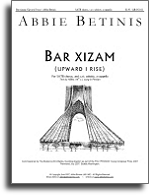
- or -
Look inside!
Bar xizam (Upward I rise)
winner of the POLYPHONOS Young Composer Prize
Voicing: SATB div. a cappella, with soprano, alto and tenor solosText: Khwajeh Shams al-Din Muhammad Hâfez-e Shirazi (ca. 1320-1390)
Language: Medieval Persian
Duration: 8 min.
Commissioned by: The Esoterics
Premiere: July 2007; The Esoterics (Eric Banks), Washington, USA
Published by: Abbie Betinis Music Co., AB-052-02
Score Sample: PREVIEW THE SCORE (pdf)
- Rosemary Ponnekanti, The News Tribune (Tacoma, WA), July 2007
". . .a marvelous work. . .incredible compositional techniques that we find very exciting."
- Anton Armstrong, conductor of The St. Olaf Choir, January 2010
"A high point in the program . . . rhythmically and tonally free . . . The audience sat silently, transfixed by the beauty and creativity of the piece and granted the composer, who was in the audience, a prolonged ovation. At intermission she was besieged by admirers."
- Joyce Tamer, Telegram (Worcester, MA), Feb 2010
The Saint Olaf Choir live at North Central ACDA in Orchestra Hall, Minneapolis.
Conductor Anton Armstrong; Soloists Elizabeth Kerstein (mezzo), Francesca Cavilia (soprano), and Erik Akervik (tenor).
LISTEN
PROGRAM NOTE
 Khwajeh Shams al-Din Muhammad Hâfez-e Shirazi (ca. 1320-1390) was born in Shiraz, Persia (Iran). He wrote nearly 400 lyric poems, called ghazals, and is the undisputed master of that particular poetic form. His writing is mystical and based on Sufism, a tradition of Islam that is associated both with the Sunni and Shi'a denominations, as well as other currents of Islam. This particular ghazal, excerpted a bit in this setting, is written on Hâfez's tombstone.
Khwajeh Shams al-Din Muhammad Hâfez-e Shirazi (ca. 1320-1390) was born in Shiraz, Persia (Iran). He wrote nearly 400 lyric poems, called ghazals, and is the undisputed master of that particular poetic form. His writing is mystical and based on Sufism, a tradition of Islam that is associated both with the Sunni and Shi'a denominations, as well as other currents of Islam. This particular ghazal, excerpted a bit in this setting, is written on Hâfez's tombstone.
The music has a very specific structure, moving systematically from confinement to freedom. Each singer begins on a hum, which to me depicts confinement: the desire to create something (in this case sound) without the means to see it through (to open one's mouth). Each of the four voice parts begins to explore a very small musical interval and to gradually expand it. At each soloist's cry "Bar xizam!" another voice part is "freed" and joyfully begins to sing scales and glissandi, building into a whirling invocation to the Beloved.
So much of writing music is about studying things close-up. The exact articulations, dynamics, intricacies of text setting But as I was wondering how best to set this magnificent text to music, I found myself stepping farther and farther back from the page. I began to search of a larger compositional gesture that could paint what I was starting to envision: whole crowds of people, through the centuries even, rising up - whether in the name of religion, social justice, personal healing - all, like Hâfez, longing for something better. So I studied up on the Shepard scale, the auditory illusion of a never-ending rising scale (not unlike M.C. Escher's famous staircase, or the endlessly rising stripes on a barber pole). In one part of this piece, I've tried to recreate that illusion by overlapping a few specific series of rising glissandi, hoping that it gives the impression of these countless souls in their continuous ascent.
This piece is dedicated, with much love, to my parents, John and Emily Betinis, who continue to teach me, by their example, how to rise up.
- Abbie Betinis, 2007TEXT
Waiting, where is the harmony of your voice, so that, free from the desires of this life: I might rise?
I am a dove from paradise, but out of this worldly cage: I shall rise.
If, in your devotion, you call upon me to serve you, then I promise, from the desires of life and this world: I will rise.
O Lord, from the cloud of your grace, let your rain fall over and over,
Before this, from the midst of it all, like a handful of dust: Let me rise.
O rise up, with sweet gesture, and show me your stature: lofty, like the cypress, So that, free from the desires of this life: I may rise.
With dancing feet: I rise. With clapping hands: I rise.
On the day that I die, in the span of a single breath, grant me but a glimpse of you,
And then, like Hafez, free from the desires of life and this world: upward, I rise!
Translated from the Persian by Eric Banks and the composer, after renderings by Michael Boylan and H Wilberforce Clarke.
Apeiron Vocal Ensemble (Daniel Pickens-Jones), New York
Eastman School of Music, New York
James I. ONeill HS Select Choir (Christopher Reynolds Sheehan), New York
Lawrence University Concert Choir (Phillip Swan), Wisconsin
Metropolitan State College of Denver Chorale (Michael Kornelsen), Colorado
Missouri State University Chorus (Guy Webb), Missouri
Peregrine Vocal Ensemble (Emilie Amrein), Illinois
Philadelphia Singers (David Hayes), Pennsylvania
Seminole HS Seminole Singers (Daryl Yasay), Florida
St. Martin's Chamber Choir, Colorado
The Esoterics (Eric Banks), Washington
The St. Olaf Choir (Anton Armstrong), 2010 East Coast US Tour
(Have you performed this piece? Add your performance!)
